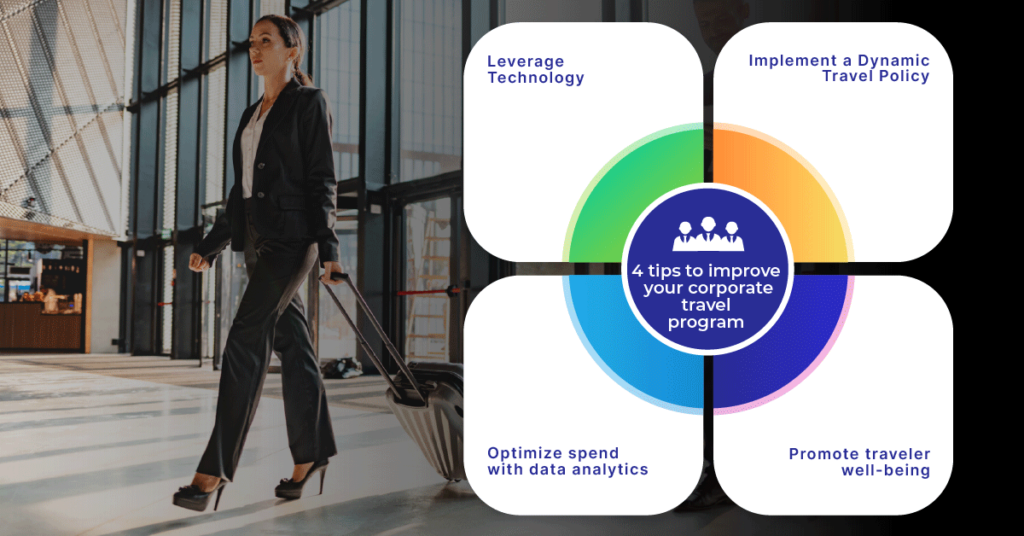
Traditionally, organizing business travel can be a hassle due to the time-consuming task of booking flights and accommodations. Last-minute changes often complicate this process, leaving little room for flexibility. It involves scrolling through multiple websites to find the best deals on airfares and hotels. This also adds pressure on travel coordinators to keep up.
With an expected increase in business trips for 2024 by 59%, companies are increasingly turning to Travel Management Companies (TMCs). These companies offer user-friendly software solutions to streamline your corporate travel program.
Automation simplifies the booking process and delivers significant savings. This blog focuses on the top 4 tips you must implement for a successful travel program.
Top 4 Tips to Make Your Corporate Travel Program More Efficient
1. Leverage Technology
Utilize advanced travel management software (TMS) to streamline booking, approvals, and expense reporting. These tools can integrate with your company’s systems, providing real-time data and analytics. Key features to look for include:
Mobile Accessibility
Employees can manage their travel plans anytime and anywhere, increasing flexibility and reducing the need for constant back-and-forth communications with travel managers. This allows for last-minute changes and quick access to important travel information.
Automated Expense Reporting
Automating expense reporting reduces the time spent on manual data entry, allowing employees to focus on more critical tasks and improving overall productivity. This also speeds up the approval process, leading to quicker reimbursements.
Enhanced Data Security
The best corporate travel programs and software often include robust security features to protect data.
Integration with Expense Management
The best corporate travel programs software often includes integrated expense management features. These features enable employees to capture receipts, categorize expenses, and submit reports directly from their mobile devices. This streamlines the expense reporting process and reduces administrative burdens.
Suggested Read:
8 Advantages of Online Travel Management Software
2. Implement a Dynamic Travel Policy
Creating a corporate travel policy that is both flexible and comprehensive requires balancing cost control with employee comfort and productivity. Here are six key points to consider:
Preferred Vendors and Negotiated Rates
Establish relationships with preferred airlines, hotels, and car rental agencies to secure better rates and consistent service quality. Bulk booking agreements can significantly reduce travel costs. Preferred vendors also ensure reliability, enhancing traveler satisfaction.

Travel Classes and Accommodation Standards
Clearly define standards for different levels of travel, such as economy, business, or first class for flights, and specific hotel star ratings. This ensures consistency and fairness across the organization. Allow flexibility based on the trip’s duration and purpose.
Flexible Booking Options
Negotiate flexible cancellation policies with travel vendors to accommodate changes without incurring high charges. You can also allow employees to choose travel options within the policy framework, which helps improve alignment with business travel management programs.
Regular Updates
You must keep the policy up to date with industry changes. Further, regularly gather feedback from travelers to identify pain points. Use this feedback to refine the policy, making it more user-friendly.
Sustainable Travel Practices
Add sustainable travel practices into the policy, such as encouraging eco-friendly hotels. Track and report the carbon footprint of business travel.
3. Monitor and Optimize Travel Spend with Data Analytics
Regularly review travel data to identify trends and areas for cost savings. Use data analytics to make informed decisions and optimize your corporate travel program. Focus on:
Spend Analysis
Track spend by department, trip, and traveler to identify high-cost areas. This helps pinpoint where overspending occurs and allows for targeted cost-saving measures. Regular reviews can lead to more strategic budget allocation.
Compliance Monitoring
Ensure that employees adhere to travel policies by using data analytics to flag non-compliance issues promptly. Use the best corporate travel programs software for automatic compliance. Addressing these issues can prevent unnecessary expenses and maintain policy integrity. Regular monitoring also reinforces policy adherence.
Performance Metrics
Use key performance indicators (KPIs) to measure the effectiveness of your travel program. Focus on cost savings, traveler satisfaction, and booking efficiency. KPIs provide insights into how well the business travel program meets its goals and where improvements are needed. Regularly updating these metrics helps improve the corporate travel program.
Trend Analysis
Analyze travel data to identify trends, such as seasonal travel patterns. Understanding these trends can help negotiate better rates with vendors. Trend analysis also aids in forecasting future travel needs.
Budget Forecasting
Use historical travel data to accurately forecast future travel budgets. Data analytics can predict spending patterns and help allocate resources more effectively. Accurate forecasting ensures that funds are available when needed and avoids budget shortfalls.
Vendor Performance Evaluation
Regularly assess the performance of travel vendors using data analytics. Evaluate factors like cost, service quality, and reliability. This information helps negotiate better deals and select vendors that provide the best value for the company.
4. Promote Traveler Well-being and Satisfaction
Employee well-being should be a priority. Happy and healthy travelers are more productive and less likely to experience travel-related stress. Implement initiatives like:
Work-Life Balance
Encourage employees to prioritize rest and recovery after long trips by promoting time off and avoiding back-to-back meetings upon their return. This helps prevent burnout and maintains productivity.
Comfortable Travel Options
To minimize travel fatigue, allow flexibility in choosing a corporate travel program that involves travel times and layover durations. Providing options for comfortable seating, meal preferences, and accommodations can enhance traveler satisfaction and well-being.
Wellness Programs
Offer wellness business travel programs that promote physical and mental health. It can include access to fitness facilities, meditation apps, or healthy meal options. These initiatives support overall well-being and morale.
Traveler Support Services
Provide 24/7 traveler support services for travel arrangements, emergencies, and logistical issues. Accessible support helps reduce stress and ensures travelers feel supported throughout their journey.
Feedback Mechanisms
Implement feedback mechanisms to gather insights on traveler experiences and well-being. Regular surveys or one-on-one feedback sessions can identify areas for improvement and demonstrate a commitment to traveler satisfaction and well-being.
Suggested Read:
A Guide to Travel Policy Automation
Partner with a Reputable Travel Management Company
Navigating business travel can be complex, and it can lead to various challenges without efficient management. Therefore, you can partner with a corporate travel management company or TMC to get more results from your travel management program. itilite offers software that is a strategic solution to streamline your corporate travel program effectively.
With robust features tailored to corporate needs, itilite empowers organizations to easily manage travel logistics, focusing more on core business objectives and less on travel-related complexities.













